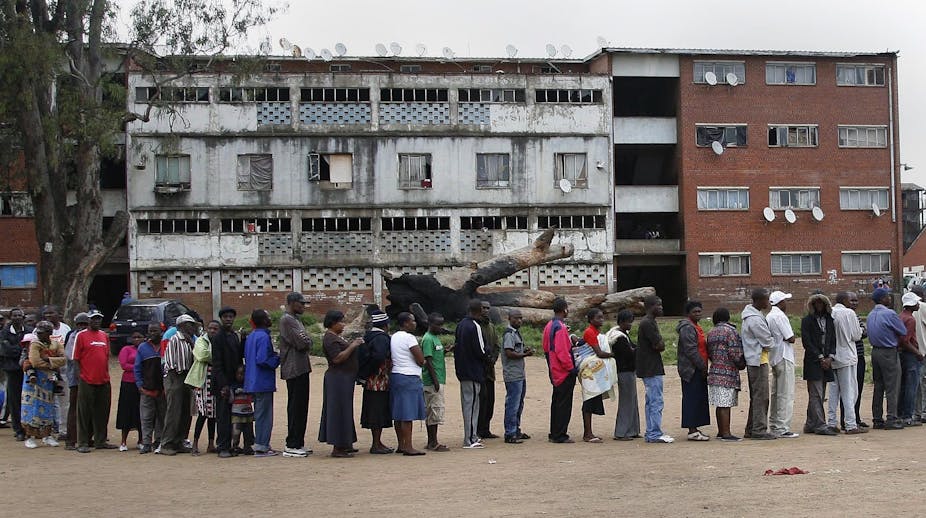Democracy in Zimbabwe is a troubled creature. Yet Zimbabwean women are leading the way with a democratic agenda that offers inspiration, instruction and, indeed, a critique for Australian democracy.
Oxfam’s Development Talks (DETalks) presented a panel of Zimbabwean female parliamentarians and civil society leaders in Melbourne last week. The Zimbabwean speakers, representing different provinces and political parties, shared their many success stories and challenges. There were two outstanding points among a longer list of the women’s political achievements.
A women’s caucus in parliament
The first concerns the fact that Zimbabwe has a women’s caucus in the country’s bicameral parliament. Both houses recognise this caucus as a standing committee of parliament.
The caucus is composed of some 60 female current or former parliamentarians (including a vice-president) from multiple parties. When it comes time to talk in the caucus, members are asked to leave their party politics at the door. This is a non-partisan association devoted to representing the interests of women and youth across Zimbabwe’s ten provinces.
This representation is no small task. A majority of Zimbabwe’s population can be categorised as youth (under 35) and a majority of that youth is female.
Female leaders in Zimbabwe have even encouraged the development of women’s caucuses in other African countries such as Rwanda (where women hold roughly 60% of the seats in the national parliament). In Melbourne, the panellists revealed they had, during an earlier visit to Canberra, encouraged Australian MPs to form a women’s caucus.
Equality written into constitution
The second point concerns another fact: the women’s caucus was a key player in the creation of Zimbabwe’s new Constitution, which came into effect last year. One of their remarkable achievements is Section 17 of the Constitution. Article 1b makes clear that:
The state must take all measures, including legislative measures, needed to ensure that: (i) both genders are equally represented in all institutions and agencies of government at every level; and (ii) women constitute at least half the membership of all commissions and other elective and appointed governmental bodies established by or under this Constitution or any Act of Parliament.

Women have been active participants in Zimbabwean politics, especially in the last ten years. Since the last electoral cycle, they have increased the number of female parliamentarians from about 15% to 31.5%. In Australia’s federal parliament, female representation is 26%, which is not much higher than the 22% global average.
The Zimbabwean upper house has a defining feature too, a “zebra list system”, which dictates that parties submit lists of candidates showing women and men alternating, with a woman at the top of each list.
These achievements are remarkable not only because they happened in a largely patriarchal society, but also because they offer direction to the so-called “leaders of democracy” in this world – to which Australia is a claimant.
Female Zimbabwean parliamentarians and civil society activists are, for instance, fostering female-to-female mentorship programs (technically a cadetship for female university graduates to work with female MPs). They ran a gender audit for each major political party. And, importantly, they are banding together to work both against and beyond the rules of the political game – rules established by men.
An ongoing democratic struggle
The women have arrived in the politics of Zimbabwe. And the women will keep arriving. We were told that women might not be adequately seen in the media, but they are visible in the halls of power.
All of this being said, the risk is that their achievements will still fall into that terrible category called symbolatry where progress, even if enshrined in a constitution, can slowly and quietly die from increasing irrelevance. This risk is already on the radar. The panellists in Melbourne vowed to keep up the fight and Oxfam vowed to continue supporting these leaders.
In response to our question about the strength of the Zimbabwean democratic spirit, the answer, from Tsitsi Mhlanga, was striking:
Although I cannot see your pulse, I know you have one, because your heart is beating. I can see that the pulse of Zimbabwe’s democratic politics is strong because of how it is growing.
If it stops growing, if we stagnate, then maybe the heart of our democracy has stopped. Women sit under trees, meet in halls and go to all sorts of councils and places of power to fight for their space, to fight for their rights, and to empower themselves – but they do this also for all of the women in Zimbabwe and beyond.
Another MP, Petronella Kagonye, provided a message that encapsulated the evening, one that rings clear and across borders:
Women need to continue singing our song. To protect what we have gained – to keep going forward.
Many Australians are singing such a tune. But these days it seems somehow harder to hear that emancipating melody of gender equality, pay parity and not just respect for but advancement of women’s rights.
We thank Angus Hohenboken (Oxfam), Annastancia Ndhlovu MP, Petronella Kagonye MP, Yasimine Toffa MP, Lucia Matibenga MP, Tsitsi Mhlanga and Kimberley Nyatanga (WiPSU), Chiedza Simbo (ZWLA), Dr Tsitsi Choruma (Oxfam) and Lucina Machansi (Oxfam) for making this article possible.

